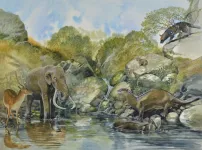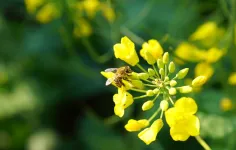(Press-News.org) Social learning plays an important role in a honey bee’s ability to “waggle dance,” report researchers, who observed that honey bees not exposed to the dances of older, more experienced nestmates produced disordered dances full of errors. The findings demonstrate that social learning shapes this complex form of insect communication, just as it does in humans, birds, and other social vertebrate species. The waggle dance is a behavior that honey bee foragers use to communicate spatial information about the precise location of a food source to other nestmates. During the dance, the performing bee dances a series of figure-eight-shaped loops in the hive while waggling her abdomen. The length and angle of each waggle run encode the flight distance and direction to the target. Nestmates that observe the dancer learn where the bounty is located. While it’s recognized that there is a genetic component underlying the waggle dance, less is known about whether it is a fully innate behavior or one learned and/or enhanced via social learning. However, according to Shihao Dong and colleagues, if the dance was fully innate, young bees would be able to perform the dance correctly, even if they had never witnessed the behavior before.
To evaluate this question, Dong et al. set up honey bee colonies composed exclusively of newly emerged bees and found that, despite having no prior exposure to the behavior themselves, they began to display the dance a week or two after hatching. However, these inexperienced bees danced dances with significant errors in distance and direction. And, while the accuracy in direction improved as immature bees gained experience, they consistently overestimated distance in their dances throughout their life. Immature bees from control colonies, which were able to observe the dances of older, experienced bees before initiating their own dances, did not suffer similar shortcomings. “Some scholars assume that instinct is by default the ancestral (or primitive) state and that learning is more advanced. The opposite is more rarely considered: Individual learning might be at the root of some behavior innovations that are not partly innate,” write Lars Chittka and Natacha Rossi in a related Perspective. “The study of Dong et al. adds to the growing evidence that complex behaviors are seldom entirely innate.”
END
Social signal learning enhances a honey bee’s waggle dance performance
2023-03-09
ELSE PRESS RELEASES FROM THIS DATE:
Island dwarfs and giants are disproportionality prone to human-mediated extinctions
2023-03-09
Island dwarfs and giants are more susceptible to extinction than other species, particularly following the arrival of humans to their insular homes, according to a new analysis of island species over millions of years. The findings highlight the vulnerability of some of Earth’s most unique species and could be used to inform conservation strategies to preserve them. Although they cover less than 7% of the planet’s surface, islands are hotspots of biodiversity. Due to their isolation, islands often contain species ...
Presenting a synapse-by-synapse map of an insect’s brain
2023-03-09
Researchers have presented the connectome – or synaptic wiring diagram – of an entire Drosophila larva brain. This first-ever insect whole-brain connectome is larger and more complex than previously reported connectomes and represents a valuable resource for future experimental and theoretical studies of neural circuits and brain function. The brain comprises complex networks of interconnected neurons that communicate through synapses. Understanding the brain’s network architecture is critical to understanding brain function. However, due to technological constraints, imaging entire brains with electron microscopy (EM) and reconstructing ...
The “MIDAS” platform detects protein-metabolite interactions
2023-03-09
To help improve the discovery and characterization of elusive interactions between proteins and metabolites, researchers present MIDAS (Mass spectrometry Integrated with equilibrium Dialysis for the discovery of Allostery Systematically). According to the authors, MIDAS represents a powerful new tool to “identify, understand, and exploit previously unknown modes of metabolic regulation across the protein-metabolite interactome.” The interactions between proteins and small-molecule metabolites are among the most common and fundamental types of biological interaction and play vital ...
Insular dwarfs and giants more likely to go extinct
2023-03-09
Leipzig/Halle. Islands are “laboratories of evolution” and home to animal species with many unique features, including dwarfs that evolved to very small sizes compared to their mainland relatives, and giants that evolved to large sizes. A team of researchers from the German Centre of Integrative Biodiversity Research (iDiv) and Martin Luther University Halle-Wittenberg (MLU) has now found that species that evolved to more extreme body sizes compared to their mainland relatives have a higher risk of extinction than those that evolved to less extreme sizes. Their study, which was published in Science, also shows that extinction rates of mammals ...
Honey bees use social learning to improve waggle dancing
2023-03-09
In a study published in Science, researchers from the Xishuangbanna Tropical Botanical Garden (XTBG) of the Chinese Academy of Sciences and the University of California San Diego have shown that honey bees use social signal learning to improve their ability to waggle dance.
Social learning shapes honey bee signaling, as it does communication in human infants, birds, and several other vertebrate species, according to the researchers.
Social learning occurs when one individual learns by observing or interacting with another. Eusocial insects (i.e., insects with an advanced level of social ...
Scientists call for global push to eliminate space junk
2023-03-09
Scientists have called for a legally-binding treaty to ensure Earth’s orbit isn’t irreparably harmed by the future expansion of the global space industry.
In the week that nearly 200 countries agreed to a treaty to protect the High Seas after a 20-year process, the experts believe society needs to take the lessons learned from one part of our planet to another.
The number of satellites in orbit is expected to increase from 9,000 today to over 60,000 by 2030, with estimates suggesting there ...
First wiring map of neurons in insect brain complete
2023-03-09
Researchers have built the first ever map showing every single neuron and how they’re wired together in the brain of the fruit fly larva.
This huge step forwards in science will ultimately help us understand the basic principles by which signals travel through the brain at the neural level and lead to behaviour and learning.
The map of the 3016 neurons that make up the larva’s brain and the detailed circuitry of neural pathways within it is known as a ‘connectome’. It’s the largest complete brain connectome described yet.
Professor Marta Zlatic ...
Large-scale study enables new insights into rare eye disorders
2023-03-09
Researchers have analysed image and genomic data from the UK Biobank to find insights into rare diseases of the human eye. These include retinal dystrophies – a group of inherited disorders affecting the retina – which are also the leading cause of blindness certification in working-age adults.
The retina is found at the back of the eye. It’s a layered tissue that receives light and converts it into a signal that can be interpreted by the brain. Each retinal layer comprises different cell types that play a unique role in this light conversion process.
For this study published in the journal PLOS Genetics, the researchers focused ...
University of Ottawa's Dr. Natasha Kekre wins national recognition for early career success in healthcare research
2023-03-09
Dr. Natasha Kekre is this year’s national winner of a “young investigator award” from the Canadian Society for Clinical Investigation (north_eastexternal linkCSCI), an organization that represents early career healthcare researchers across the country.
An exceptionally motivated scientist, Dr. Kekre is an associate professor at the uOttawa Faculty of Medicine, as well as a scientist and hematologist at The Ottawa Hospital.
Dr. Kekre says she’s been “very fortunate” to be in Ottawa’s dynamic medical research hub and benefit from having internationally ...
Nirogacestat, a new desmoid tumor treatment, improves outcomes for people with sarcoma
2023-03-09
A phase 3 clinical trial (research study) of a targeted therapy called nirogacestat has found that the drug significantly shrank desmoid tumors in 41% of patients.
Desmoid tumors (also known as aggressive fibromatosis) are a rare type of soft tissue tumor, and MSK has a team of doctors who are dedicated to treating them.
When Dana Avellino, now 36, first noticed a lump near her groin in the summer of 2018, she thought it was related her recent cesarean section. Her younger daughter was only 2 months old at the time. When a biopsy revealed that the lump was a sarcoma, a type of tumor that ...




